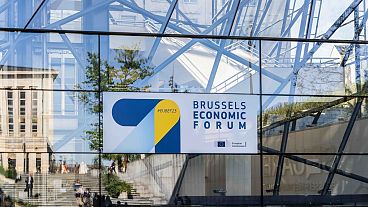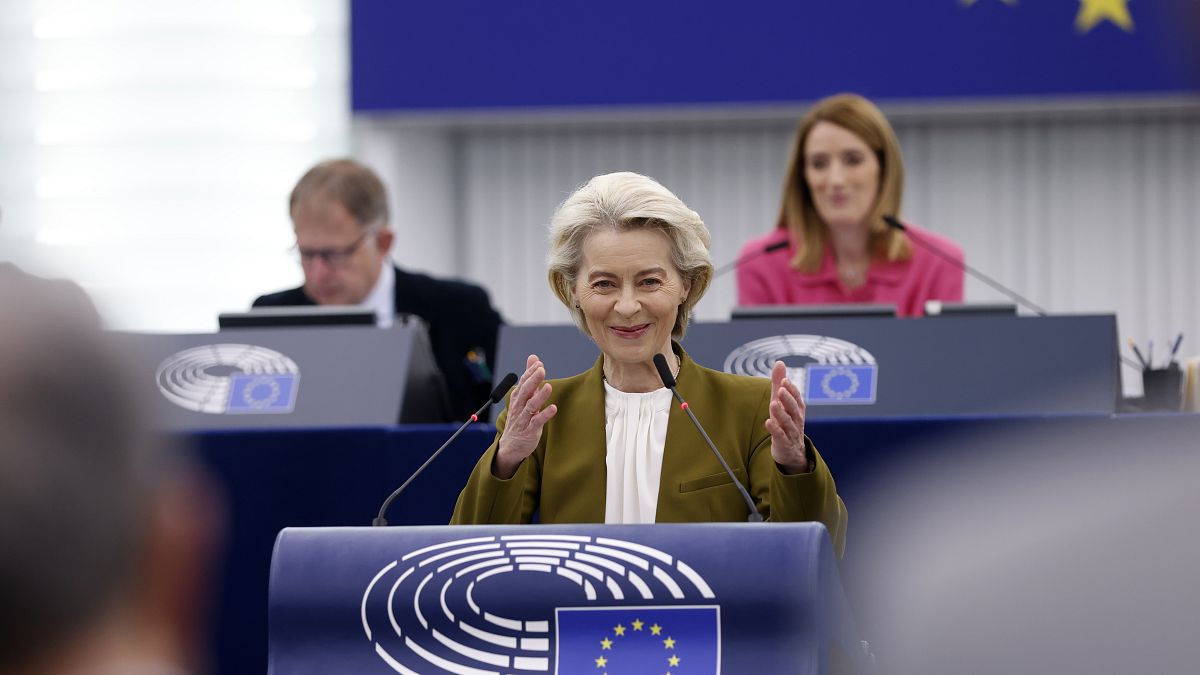This edition of State of the Union focuses on the enlargement "Big Bang" in 2004, speculation about new political alliances after the elections and sizeable cracks in the block of far-right parties.
Twenty years ago this week, the European Union saw the biggest enlargement round ever.
On May 1st, 2004, ten states simultaneously joined the bloc, seven of them from beyond the former Iron Curtain. Some called it the “Big Bang”.
In a rather mute celebration, the European institutions in Brussels, Strasbourg and Luxembourg were lit up for the occasion this week.
EU Council President Charles Michel advocated new members: “Enlargement is vital for the future of the EU because without enlargement there is, in fact, a risk for a new Iron Curtain, and this would be extremely dangerous, if you would have an unstable neighbourhood with a lack of prosperity or lack of economic development.”
Whether countries like Serbia, Georgia or Ukraine will get a seat at the Brussels table any time soon is doubtful.
In the ongoing election campaign for the European Parliament enlargement is not a hot topic, to put it mildly.
Speaking of the campaign… This week, people started speculating about a new political alliance, previously unheard of, namely a coalition of center-right and far-right parties.
When asked about it during a debate, the Commission president and center-right candidate Ursula von der Leyen had this to say: "It depends very much on how the composition of the Parliament is and who is in what group."
This fits well with a statement by the hard-right prime minister of Italy, Giorgia Meloni, who would love to team up with von der Leyen’s European People’s Party: “In addition to being the leader of the “Brothers of Italy”, I am the leader of the European Conservatives, who want to play a decisive role in changing the direction of European policies.”
Meloni’s party leads the polls in her country, and she aims to replicate the scheme at power in Italy: an alliance of EPP and far-right groups ECR and Identity & Democracy.
Polls suggest that the next European Parliament will shift even more to the right, as nationalist and populist parties seem to be gaining ground.
Some observers already predict a legislative agenda paralysed by a solid right-wing block. But a recent analysis by the European Council on Foreign Relations shows there are a lot of cracks in this block.
We spoke about it with Pawel Zerka, senior policy fellow at the ECFR and the lead analyst on European public opinion.
Euronews: So, your recent polling suggests deep divisions between Europe’s far-right parties. How, for example, does this play out when it comes to support for Ukraine?
Zerka: So, this is one of the areas where the parties of the far right will struggle to agree. Not just far right, Eurosceptics as well. So obviously there are some parties, like Alternative for Deutschland, or a Geert Wilders' party in the Netherlands, who are much more on the side of no longer supporting Ukraine and seeing the European current support as warmongering. But there are parties, of course, like Polish Law and Justice, which are strongly supportive of Ukraine. And even in Italy, Giorgia Meloni has shown to be a strong transatlanticist and a reliable, supporter of a European line of support for Ukraine.
Euronews: What about a hypothetical exit from the EU - isn’t that a pet project that nationalist parties are plotting?
Zerka: It's no longer that fashionable in Europe. And many of the European far-right or anti-European or Eurosceptic parties have chosen right now to focus on repairing Europe from inside rather than leaving the EU.
Euronews: We’re just weeks away from election day – what would be a strategy to counter the far-right in the election campaign?
Zerka: The problem I see right now is that many of the parties of the far right, have the electorates which are strongly mobilised. So, their voters believe that these are important elections and they, largely, want to go and vote, whereas the electorates of the pro-European side are often quite demobilised, as if people didn't understand what are the stakes of this election? Why should that matter? So, my main recommendation for the leaders of pro-European parties is to express quite clearly to their voters why those elections are important.
Euronews: And what about the voters of far-right parties, can they still be swayed?
Zerka: Rarely. I think that the question is mostly about whether they will be strongly mobilised or whether some of them would stay at home. If the pro-European side reminds the voters about the various risks that voting for AfD in Germany, Marine Le Pen in France or Kaczynski in Poland brings, then perhaps some of the people who are currently saying, yes, I would like to vote for those parties. Maybe they will think twice.
In other news, we’re now a week away from one of the biggest European events of the year, the European Song Contest, hosted by the Swedish city of Malmö.
While technical and artistic preparations are well under way, the event is causing major headaches for the Swedish security authorities.
In a 23-page report, most of it classified, law enforcement summarises serious threats to the competition. Like cyber-attacks, denial-of-service attacks or civil unrest.
Authorities are also coping with the fact that Sweden is a prime target for violent Islamist terrorist organisations.
In addition, major protests against Israel’s participation in the contest are expected.
Swedish police believe they are prepared for all kinds of scenarios.
They hope the European Song Contest proceeds smoothly – and I guess they also want Sweden not to win this time, so that someone else can host the event next year.


